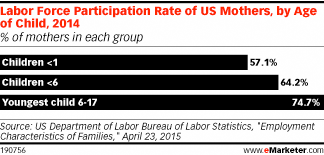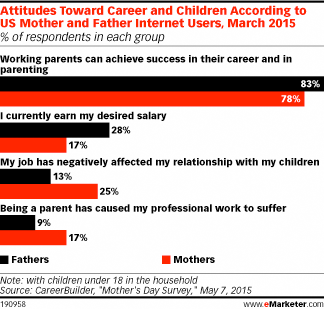Is Work-Life Balance a Full-Time Job for Working Mothers?
July 11, 2015
![]() Though the Great Recession’s sluggish job market pushed some mothers into stay-at-home status, a large majority are in the workforce. Many—but by no means all—of these working mothers feel stressed by trying to balance work and family, according to a new eMarketer report, “US Mothers 2015: Tracking Today’s Patterns of Motherhood, Digital and Otherwise.”
Though the Great Recession’s sluggish job market pushed some mothers into stay-at-home status, a large majority are in the workforce. Many—but by no means all—of these working mothers feel stressed by trying to balance work and family, according to a new eMarketer report, “US Mothers 2015: Tracking Today’s Patterns of Motherhood, Digital and Otherwise.”
 Seven in 10 mothers in the US were in the labor force last year, according to an April 2015 bulletin by the US Department of Labor Bureau of Labor Statistics. There is considerable variation depending on the age of a mother’s children. Even among mothers of infants, though, a majority were working.
Seven in 10 mothers in the US were in the labor force last year, according to an April 2015 bulletin by the US Department of Labor Bureau of Labor Statistics. There is considerable variation depending on the age of a mother’s children. Even among mothers of infants, though, a majority were working.
Stress entailed in combining work with childrearing is a common theme. In an April 2015 survey from Care.com and Yahoo Parenting, 38% of mothers who worked full time and 25% who worked part time said they found it “very difficult” to balance work and family. Among mothers who were their household’s primary breadwinner, polling from June to August 2014 by Ketchum and BlogHer found 44% were more stressed than five years ago. Another Care.com survey, from August 2014, found that one-quarter of working mothers “cry alone at least once a week.”
 And yet, as bad as the numbers are, a majority of mothers did not subscribe to these laments—an implicit rebuttal to the conventional wisdom that severe stress is the default condition of working mothers. In a March 2015 survey from CareerBuilder, 78% of US mother internet users said it was possible to succeed in both career and parenting, though fewer (52%) said they were equally successful at both.
And yet, as bad as the numbers are, a majority of mothers did not subscribe to these laments—an implicit rebuttal to the conventional wisdom that severe stress is the default condition of working mothers. In a March 2015 survey from CareerBuilder, 78% of US mother internet users said it was possible to succeed in both career and parenting, though fewer (52%) said they were equally successful at both.
When family and work come into conflict, the latter often suffers along with the former. In the Allstate/National Journal Heartland Monitor Poll conducted in October 2014, 55% of working mothers said they had “fallen short at work because they had to care for a sick child, spouse or parent.”
Sometimes, working mothers reduce their vulnerability to stress by making a strategic retreat from the ideal of the flawless homemaker. That’s what Kelley Skoloda, partner and director of global brand marketing practice at Ketchum, observed in the Ketchum/BlogHer study. “The research we did showed that as far as running their households, working moms across the board have resigned themselves to not being a domestic goddess and to having a less perfect household.”



























